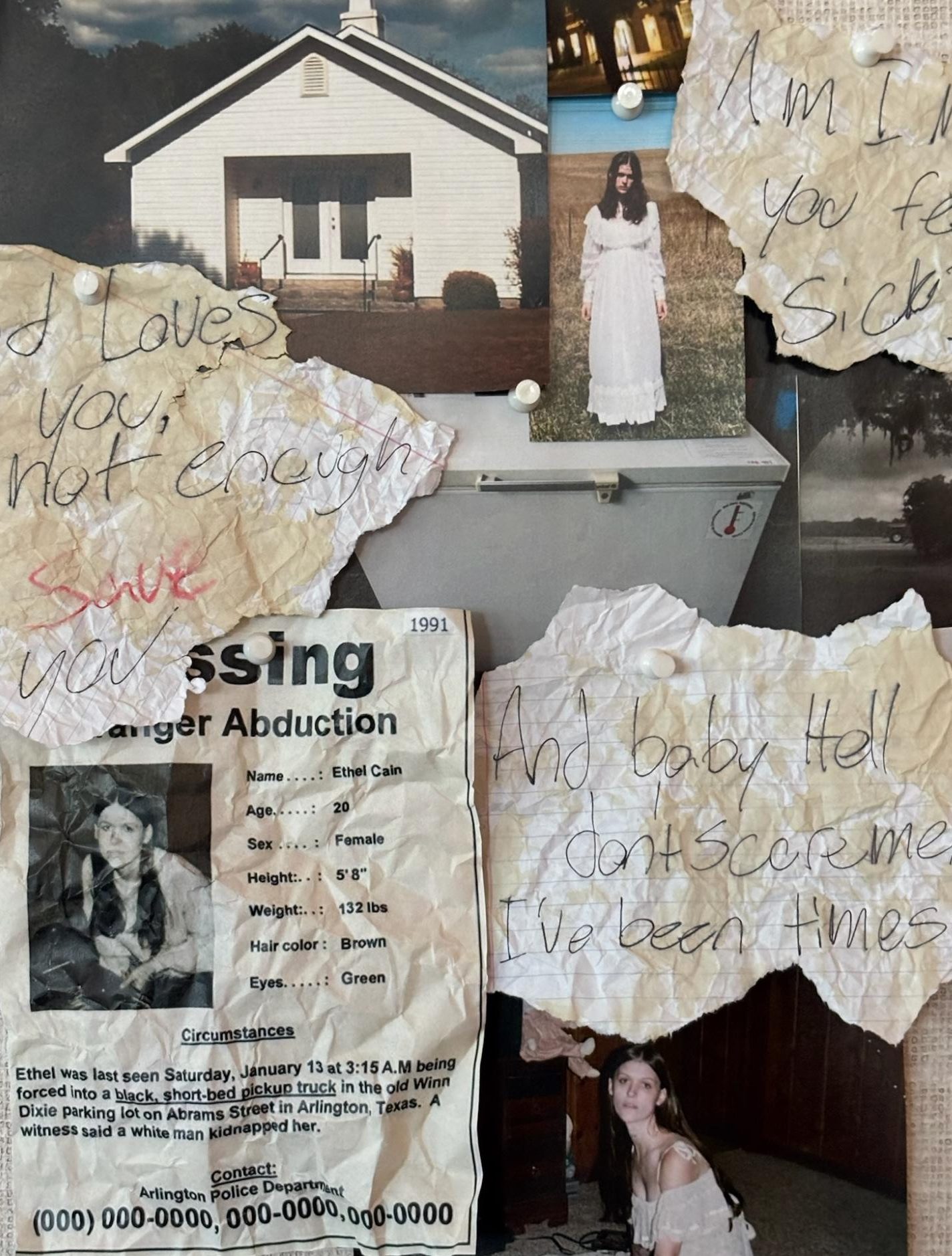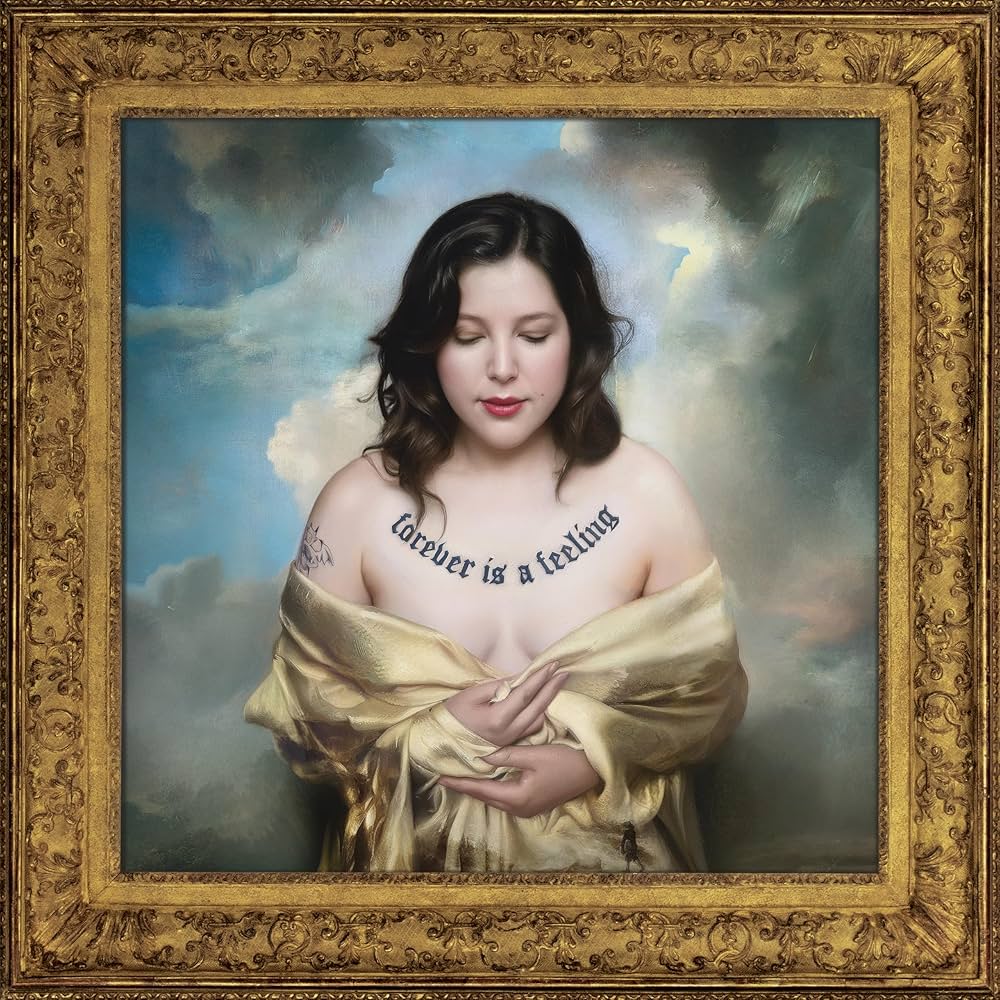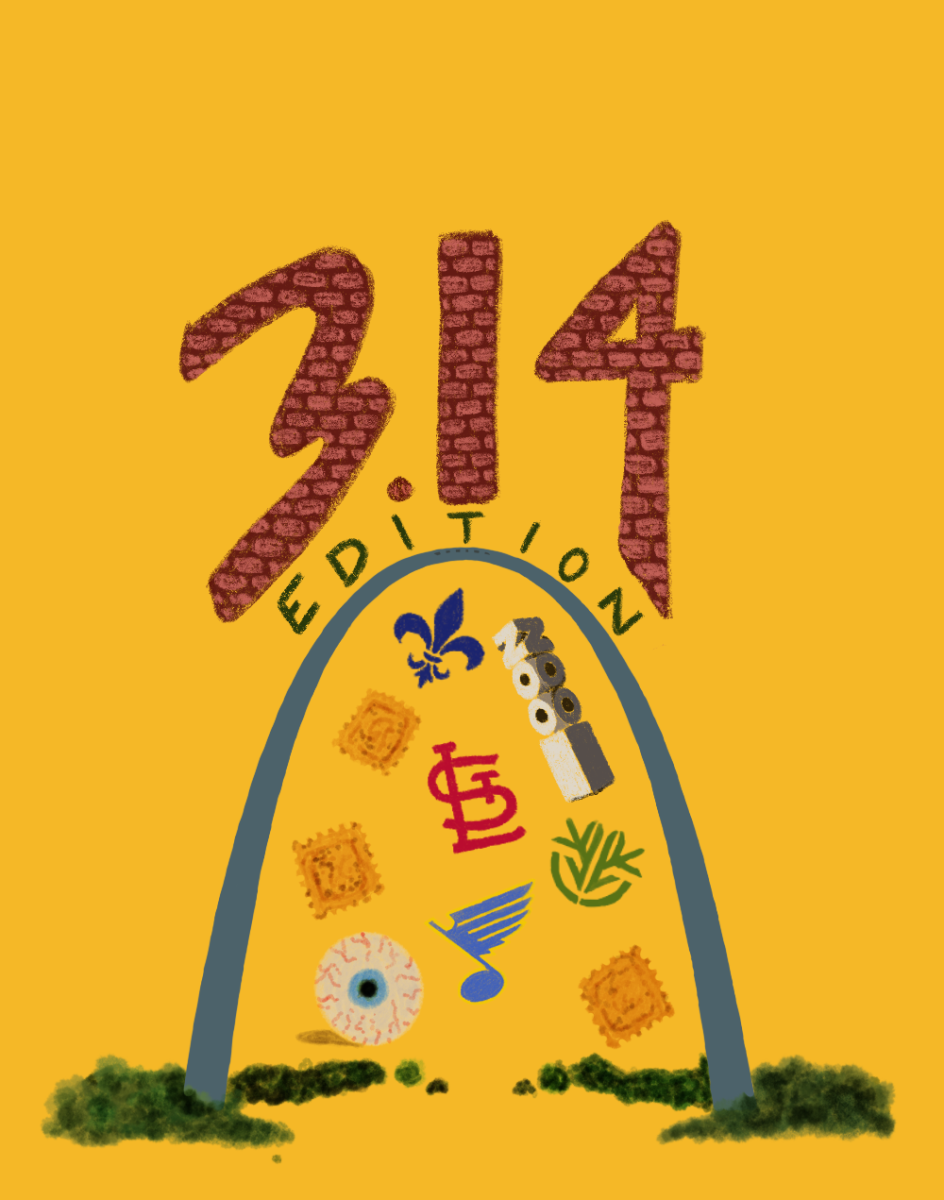Preacher’s Daughter by Ethel Cain deals with topics such as, love, loss, incest, substance abuse, religion, kidnapping, cannibalism, and murder. It is the most meaningful album created this decade.
Preacher’s Daughter is a concept album, meaning it tells the story just like a book or a movie would. The body of work starts with a song entitled “Family Tree (Intro).” In the beginning of this song you hear a sermon being given, but it is muffled by the sound of flies, foreshadowing what is to come later in the album. “Family Tree (Intro)” is where we are introduced to Ethel’s life. It is made clear by the title of the album that her father is the pastor and it is in this song you find out that Ethel is from rural Alabama. Ethel speaks about Jesus, expressing how he was cursed to have his mothers genetics. She says “Jesus can always reject his father, but he cannot escape his mothers blood.” She is saying this because she feels some things are just inescapable due to her genetics. No matter what she does she will still be known as the preacher’s daughter in her small town. Throughout this song she is exploring the idea of intergenerational trauma which is prevalent in the album.
The second song, “American Teenager,” is a commentary on, as she put it, “the American dream.” This song has lines such as “the neighbor’s brother came home in a box, but he wanted to go so maybe it was his fault,” and “a long Cold War with your kids at the front.” Ethel is criticizing military recruiters taking kids right out of high school and sending them off to fight in a far away war; but, she recognizes that it was their choice to go. This song also reveals that Ethel’s father has passed away and in his absence she has been delivering the Sunday sermon. In her bereaved state she turned to alcohol to cope with the loss. “A life full of whisky but I always deliver.” She goes on to admit she’s having doubts about religion saying She wraps up the song by claiming “it’s just not [her] year, but [she’s] all good!” Almost begging everyone to let her struggle alone.
“A House in Nebraska” is the first long song of the album, coming out to just under 8 minutes, “A House in Nebraska” does not follow the albums order of events, in fact it’s a flashback. We are introduced to Willoughby, Ethel’s childhood love. She tells the story of how they “found each other.” The pair fantasize about leaving their homes and running off to Nebraska, at least Willoughby fantasized about it, Ethel thought it would actually happen. One day Willoughby leaves town never to come back, devastating Ethel. She prays “straight to God that maybe [Willoughby] will come back around” but he doesn’t; so she turns to the bottle which only “makes it worse.” This happens before the events of “American teenager” so it can be inferred Willoughby leaving is the first time she uses alcohol to soothe herself. You can hear Ethel repeating “I love you” throughout “A House in Nebraska,” those same words will be repeated to her in the “Ptolemaea,” the ninth track of the album, prior to her demise.
After the loss of Willoughby and her father Ethel leaves her hometown moving west. That is where she finds, what she thinks, is love. In the song “Western Nights” Ethel topples head-over-heels for a criminal named Logan. She thinks “he’s never looked more beautiful… breaking into ATMs [and]… starting fights at the bar.” Even though he shows his “love through shades of black and blue,” Ethel would still “hold the gun if [he] asked [her] to.” She admits that she’s “clinging onto [him] like some love-blind addict,” but is not willing to let go. The woman we see in this song is a direct juxtaposition from the stereotypical ‘Preacher’s Daughter,’ which begs the question, why is she doing all this? The next two songs provide an answer.
Track four of the album is entitled “Family Tree.” It is in this song we get a clearer picture of why she wanted to leave her family. The song is riddled with piercing lyrics such as “I’m just a child, but I’m not above violence,” and “I’ve killed before and I’ll kill again.” The chorus of this song is an ode to Willoughby. She asks him to “take [her] down to the river and bathe [her] clean. Put [her] on the back of [his] white horse to ride all the way to the chapel.” This lyric has religious conditions. She wants to be rid of her sins, baptized. It also shows that she thinks of him as a knight in shining armor, as he’s carrying her newly purified self to the chapel on his white horse. Because she holds Willoughby in such high regard it’s understandable why she was heartbroken over his departure.
Arguably the most devastating song on the album is “Hard Times.” It’s 5 minutes long and almost sounds like a lullaby, beginning with Ethel asking her father to “tell [her] a story.” Similar to “Family tree,” the lyrics of “Hard Times” give us a better understanding of Ethel’s world view. She tells the listener she “thought good guys get to be happy” and she’s “not happy.” She explains that as a little girl she did everything to be like her father, and still does. When she was a child he would watch her, “too young to notice some types of love could be bad,” Ethel didn’t pay it much attention. She never outright says what her father did to her, only that it kept her up at night making her “too tired to move, too tired to leave.” She reflects on this memory exclaiming she’s “tired of [him] still tied to [her].”
“Thoroughfare” is the longest song on the album standing at nine and a half minutes. It’s disguised as a happy song, but a look at the lyrics disproves that assumption. The master mind behind Ethel Cain, Hayden Silas Anhedonia, confirmed that Ethel is an unreliable narrator, meaning that some of the things she says might not be the full truth. In my opinion “Thoroughfare” is the first song on the album in which this element comes into play. Ethel describes how a man in a truck pulls over to talk to her and she gets in his car. But why would she drive away with a stranger, and where’s Logan? Because Ethel is an unreliable narrator we cannot say if she got in his car by her own volition or if she was kidnapped. We also can’t say where Logan went but it has been speculated that Ethel killed him, or he was arrested. Isiah, the man in the truck, askes Ethel if she wants to “see the west with” him. He says he’s searching for love and wants her to come with him. By the end of the song Isiah comes to the realization that Ethel is the love he had been looking for this whole time. It is left unclear if he genuinely feels this way or if he just wants to keep her and use her, as he does in “Gibson Girl.”
Track eight feels different from all the rest. “Gibson Girl” starts strong with a distorted Electric guitar that sets the scene for the filtered, slurred vocals. Ethel is now in a very bad situation as Isiah is obsessed “with the money, addicted to the drugs.” How does he get this money? He pimps out ethel in exchange for it. The only clear lyrics of the song are, “And if you hate me, please don’t tell me.” Almost as if she broke through the haze of drugs and pleaded not be told she was wrong for leaving her home town. At the end of the song there are 31 seconds of flies buzzing, again foreshadowing the tragic fate Ethel meets.
Sonically, the most haunting song of Preacher’s Daughter is the ninth track, “Ptolemaea.” “Ptolemaea” is referring to the ninth circle of Hell in the divine comedy Inferno, by Dante Alighieri. Dante’s poem describes the leaves of Hell, and which people belong in what circle. The ninth level is at the center of the Earth and is where Lucifer himself resides, as well as Judas Iscariot, the apostle who betrayed Jesus. Dante said that people who commit the worst sins, such as murdering a loved one, are sent there to be tortured forever.
“Ptolemaea” begins with an evil, distorted, male voice that is drowned out by the sound of flies. The voice of Isiah repeats “heard you, saw you, felt you, love you” as the sound of flies builds. Notice how he speaks in past tense except when saying “love you,” as if he doesn’t hear or see Ethel anymore but still loves her. He then repeats “love you” with the same tone Ethel used to say those words in “A House in Nebraska.” Ethel proclaims she is “Hiding from something [she] cannot stop.” This could be alluding to her upbringing and the feeling she cannot escape the title of Preacher’s daughter. Or Ethel could be referring to Isiah and literally saying that she cannot stop him. Isaiah says “there’s nothing I can do to you, It’s already been done,” this is when his actions become clear to not only the listener but Ethel. He begins attacking her. she begs him to stop repeating “make it stop” and “I’ve had enough,” until she breaks into a deafening, blood curdling scream telling him to stop, but he doesn’t. Isaiah then recites a sermon reminiscent of the speech given in the first song, “Family Tree (intro).” Only this time it’s dark and evil. Isaiah says
The following track is an instrumental titled “August Underground.” The track gets its name sake from a famous found footage film that documents a man’s killing spree. Overall the song leaves you feeling uncomfortable, almost as if an evil force is climbing through your ears and infecting your whole body. The track symbolizes Isaiah killing Ethel. You can feel the panic and fear Ethel felt while fighting for her life. “August Underground” seamlessly transitions into “Televangelism,” a second instrumental track. This song represents Ethel’s soul leaving her body and going to heaven, but it doesn’t comfort you, it feels almost happy but not quite. Much like Ethel’s life the song is riddled with untuned, demented notes. The song ends on an unresolved note that can be interpreted in a myriad of ways, my favorite being Ethel’s story was cut short and left unresolved, and so was the song. I also like the idea that Ethel did not receive a day of comfort in her life and neither will the listener.
The penultimate track is “Sun Bleached Flies.” Ethel sings this song from beyond the grave. She reminisces on her life saying, “what I wouldn’t give to be at church this Sunday.” Ethel admits that she burned all her bridges “and in the end [she] knew no one was coming to save [her] so [she] just prayed” but she came to the realization that God wasn’t there for her. She explains “God loves you, but not enough to save you.” She reflects on the way she was raised and her life before leaving home. This is where she admits she’s “still praying for that house in Nebraska,” when she was home and safe.
The final track of the album, “Strangers,” details what Isaiah does to Ethel’s body after death. She describes herself as a “freezer bride” that Isaiah devours “like smoked bovine hide.” Ethel says she tried to be good, which is a double entendre. The Preacher’s daughter is saying she tried to be a good person, but the frozen body of Ethel Cain is saying she tried to taste good. She thinks about how her Mom will cry when she sees her daughter on the side of a milk carton. Even in death Ethel is trying to find her person, she asks “can I be yours,” to the man that killed her. Then a persing guitar riff interrupts the song, as the beat drops and Ethel repeatedly askes “am I making you feel sick?” This lyric also has two meanings. She’s literally asking if Isaiah is sick from eating her. She is also breaking the metaphorical 4th wall and talking to the audience asking if her story is making them feel sick. She then addresses her family telling them not to think too much about her or they’ll never sleep. The final words of the album go to Ethel Cain’s Mom. She says, “Mama, just know that I love you and I’ll see you when you get here.”











